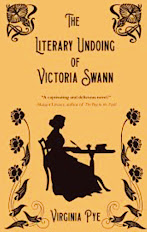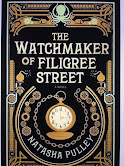Two Books Addressing Historical Feminism
by Theresa Gauthier
The Literary Undoing of Victoria Swann by Virginia Pye
The Literary Undoing of Victoria Swann was a diverting piece of fiction, engrossing in places, and an enticing concept. In it Victoria suffered what all women did at the time—that men don’t believe them capable of thinking let alone writing. There are still men like this today, more’s the pity.
Victoria Swann’s carefully choreographed life is upended when her publishing house is bought out and restructured. Losing the editor she believes is her biggest ally seems like the end of everything, until she discovers that the new editor may indeed have more to offer, and may believe in her far more than the man he’s replacing. Her fondness for her first editor is understandable, but she doesn't seem aware that he's not the staunch supporter she believes him to be.
Her new editor wants her to publish her latest book, while the man he's replacing was content to shove it in a drawer and let it die.
Victoria has a lot to prove and most of it to herself. Not really believing in herself, and feeling like a fraud since she authors books about places she’s never visited, she spends her time trying to be more authentic. Meeting a fan, she begins to see the impact her writing is having on young women, and while some prefer that she adhere to the strict moral expectations of the times, some are inspired to be more because of her heroine.
It's a solid story, though I think I'd have preferred a but more pushing of boundaries. I concede that this is a 21st Century perspective. Given the era it occupies, it's pushing quite a few. Feminism, women making their own way in the world, LGBTQ characters—I could see this making a good film or TV series.
The Moon in the Mango Tree by Pamela Binnings Ewen
Enticed at the promise of travel to exotic places, I dove into this book hoping it was going to be the book for which I’ve been pining. Taking place about 100 years ago, with a Philadelphian suffragette about to marry a doctor, we follow Barbara and Harvey as they leave behind their comfortable life in Philadelphia to become missionaries. The problems start here as neither of them seem like missionary material. Barbara, or Babs, as Harvey calls her is an opera singer. She’s been studying music most of her life, and right about the time she has to decide if she’s marring Harvey or not, she’s offered a contract and a chance to study in Chicago. Harvey is unwilling to discuss it, and even Barbara’s mother downplays the offer.
They go to Siam (Thailand) and Barbara isn’t prepared for her role at the mission. Indeed, I doubt anyone even thought about what her role should be—not even Harvey.
Harvey himself is a non-entity. The reader never gets a handle on him. We aren’t privy to his thoughts, we don’t know why he’s so dead set on being a missionary. We’re told that he’s a good man, and he’s obviously desperate to help people who don’t have access to medical care, but we learn this from others. Aside from his dedication to his profession, which, to be honest, appears to be the single most important thing in his life, we know nothing.
I’m sure the reader is meant to believe that he’s a really good man, but why he never has a real conversation with his wife, why he never tells her she might have a role to play as a missionary doctor’s wife, and why he makes no attempt to find out why she’s not happy is a mystery.
I’m not saying Barbara is an angel. She could have tried harder to work her music into her life, although her husband’s missionary friends are bigoted hypocrites. They made up their minds about her on first sight, and I doubt anything would have made them think better of her. Several things happen that I think she should have told her husband about but she chose to keep them to herself.
She doesn’t seem to understand that her husband is a doctor and in a place where there are not many doctors. He’s it. If someone needs medical care in the middle of the night, or if he has to stay at a nearby village for a while, that’s his job. Barbara seems to be of the opinion that he should keep regular hours.
Barbara endured a lot, but changed not one whit. As a matter of fact, she seemed to buy the negative talk that she was selfish, as one character after another demeans her, and her own self-talk later in the book confirms that she believes that her husband is selfless and never asked her to give up anything. It seems she somehow forgot the part about being about to embark on a promising career as an opera singer and how he downplayed the opportunity seeming to retreat behind the idea that his dreams were of far more importance and relevance than hers. It's as if a compromise wasn’t possible. It doesn't occur to anyone that he could have found poor people without access to healthcare anywhere in the United States The Moon in the Mango Tree makes a case for outdated thinking, praises a woman for acquiescing to subservience, and attempts to make it a virtue.
I know that’s the way it was back then, but I really don’t care to read about it unless I’m given a character who fights it. It started out promising—with Barbara as a suffragette, but she’s only strong in a crowd. She had no strength to stand up to anyone when she was alone.
I did enjoy both stories, and though I would have preferred a stronger ending to one of them, they're both accurate regarding feminism in their timelines.
As a side note, The Moon in the Mango Tree appears to have two covers. It looks like one is for the digital copy and one is for the paperback. I've included both in my review.









Comments
Post a Comment